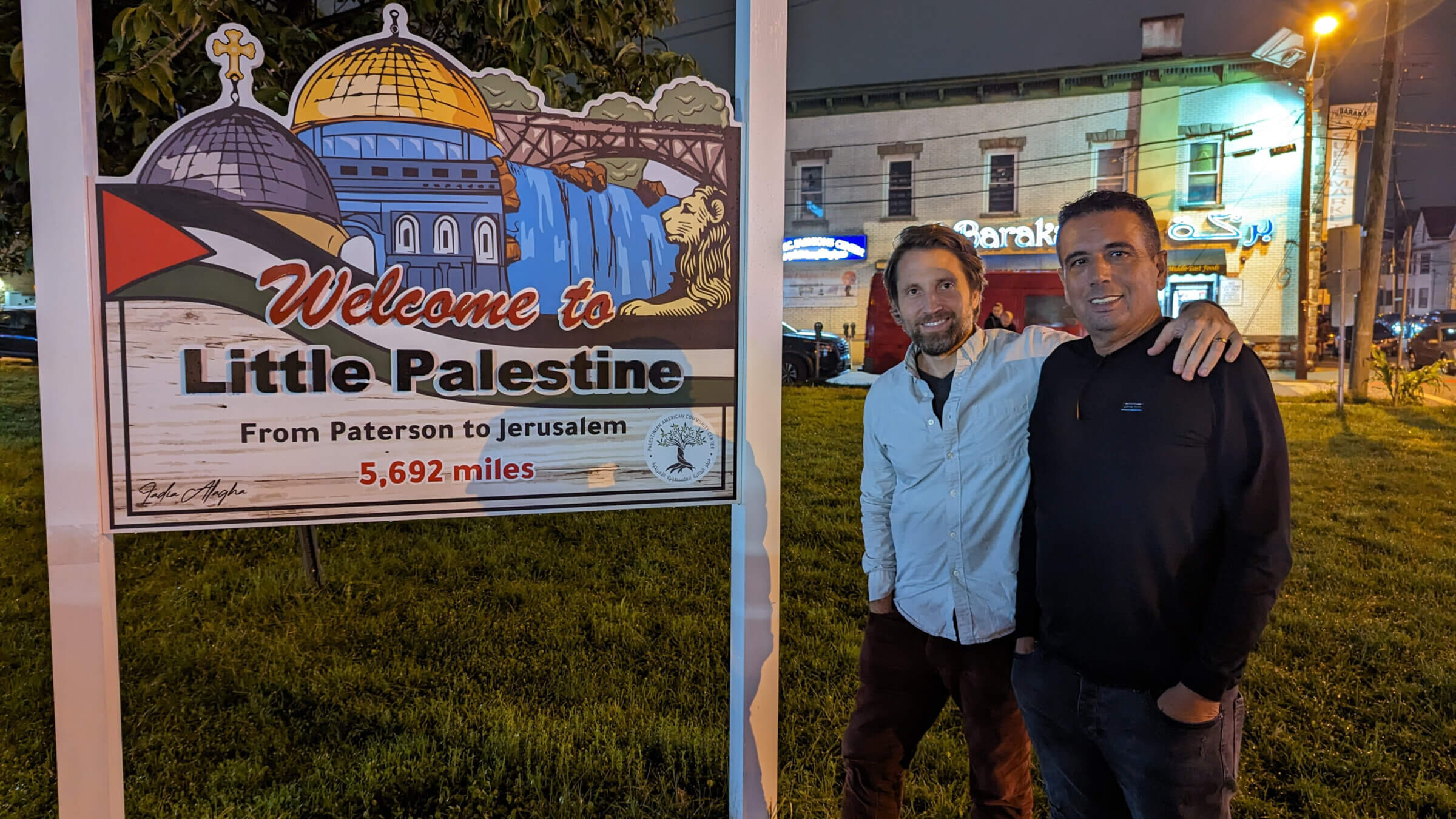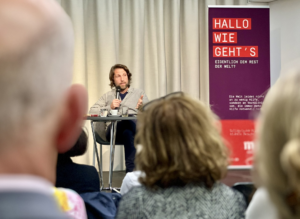Nathan Thrall won the Pulitzer because he writes with ‘feelings, and not with ink’
Since the release of his book just days before Oct. 7, the Jerusalem-based author has faced everything from rave reviews to book tour cancellations

The author Nathan Thrall and the protagonist of his Pulitzer Prize-winning book, Abed Salama, after a talk in New Jersey on Oct. 6, 2023, the night before everything changed. Courtesy of Nathan Thrall
On Tuesday, the night after he won the Pulitzer Prize for general non-fiction, Nathan Thrall was supposed to be talking about his book at the swank Union International Club in Frankfurt, Germany. The club is headquartered at the century-old Villa Merton and defines itself on its website as “cosmopolitan between tradition and zeitgeist.” Tickets to the talk cost 45 Euros.
But a few days before the event — a few days before Thrall’s book, A Day in the Life of Abed Salama, was essentially declared the year’s best of its genre — the Union Club abruptly called it off. “No notice, no explanation given,” Thrall told me.
The Union Club’s website declares it is “committed to cross-border understanding” and “considered the first address for dialogue between nations and cultures.” But not, apparently, for a book that tells the truth about Palestinians living under Israeli occupation.
Thrall ended up speaking that night, instead, to a crowd of about a 100 at Medico International, a nonprofit providing humanitarian aid to Gaza whose website headline right now is “Everyday nightmare.” Preaching, you might say, to the choir. For free, by the way.
This is the triumph and tragedy of the storytellers of this war. That a nuanced, textured, tough and fundamentally human book about Israel and the Palestinians wins the industry’s highest honor, tops every Best Books of 2023 list and is in its seventh printing. And that the discourse around it is hopelessly siloed.
As we and others reported in October, about a quarter of the events in his original six-week book tour in the U.S. and U.K. were canceled immediately after the Hamas terror attack. The book uses the devastating tragedy of Salama’s 5-year-old son being killed in a car crash as a window onto the whole century-long conflict.
“I wrote this book with the hope — which I believed was realistic — that liberal Zionists were going to read it and engage with it and be changed by reading it,” Thrall told me when we spoke by Zoom yesterday. “That this was the moment to present them with a picture of Palestinian life that would show them this is a moral catastrophe, we are complicit in its perpetuation, and we ought to be doing something with much greater urgency to end it.”
Oct. 7 and its aftermath, he sighed, meant that “it was not going to be so easy to engage with this book.” Then again, who ever said it was supposed to be easy?
I’ve known and admired Thrall for a dozen years. When I was Jerusalem bureau chief of The New York Times, he was the director of the Arab-Israeli project at International Crisis Group. Unlike many of the political and security analysts that I and other correspondents constantly quoted, Thrall’s sharp insights were always deeply rooted in on-the-ground, people-centered reporting across the West Bank, Israel and, especially, the Gaza Strip.
He seemed to know everyone and everything that was going on in Gaza. I didn’t always agree with his conclusions, but Thrall responded to questions forthrightly and with specificity. His information always checked out. I trusted him; still do.
Thrall is 44 and grew up in a secular Jewish family in the Bay Area. After his grandmother was killed in a car crash, he fulfilled her dream that he visit Israel by joining a Birthright trip in 2004. It’s an understatement to say that changed his life trajectory. He got a master’s degree in politics from Columbia University in 2006, then studied Hebrew and Arabic at Tel Aviv University, and has lived in Jerusalem the last 13 years.
He’s married to an Israeli-American literary editor, Judy Heiblum. Who was pretty much the last to hear about the Pulitzer.
It was 10:45 p.m. in Jerusalem when Thrall’s prize was announced Monday, and Heiblum goes to sleep right after their three daughters, who are 13, 9 and 7. Thrall, who was finishing a book talk in Berlin when his phone started buzzing incessantly with the news, frantically dialed Heiblum’s phone, but it was on silent.
“She had always promised me that she has it set up so that my calls can break through the Do Not Disturb,” Thrall told me. “I must have called her 30 times that night. I tried our landline. I tried SnapChatting my daughters’ iPads just to make any electronic device ding. In the end I just stayed up til like 5:30 a.m. my time until I finally reached her.
“She picks up and she’s groggy and she’s like, ‘Sweets, what’s going on?’” he continued. “I said, ‘I have been trying to reach you all night.’ She’s like, ‘What’s wrong? Whats’s wrong? So then I said it’s nothing bad, and I told her that I won.”
It’s a heady thing, winning a Pulitzer. Mark Ruffalo was among those who tweeted congratulations, referring to Thrall as “my friend.” A message from the wife of one of Thrall’s mentors, who recently died, brought the author to tears. Then there was the note from his mother: “Congratulations. Nobel next?”
“It was very on-brand for her,” Thrall said.
She is a refugee from the former Soviet Union and, Thrall said, “a very strong Jewish nationalist.” They long ago stopped talking about his work, or anything to do with Israel.
“She claims that she doesn’t read any of my articles,” Thrall told me. “I think she read the book, because when I was there in November it was by her nightstand. But she never told me that ‘I read it’ or ‘I liked it’ or anything. So I don’t really know if she read it.
“This is the elephant in the room when we are together because we cannot talk about it,” he added, referring not just to the book but to his very public criticism of Israel and the occupation. “It’s too upsetting to her.”

I asked Thrall if it’s right to characterize him as an anti-Zionist. It depends, he said, on what you mean by Zionist.
“Often the pro-Zionist side will say Zionism is the right of the Jewish people to establish a state in their ancestral homeland — meaning, in Palestine,” he noted. “That’s a backward-looking question: ‘Did you think that Jews had that right when the first Zionist settlers arrived in 1882 and the Jewish population of Palestine was 4 to 5%? I do not believe that Jews had a right to establish a state for themselves at that time, against the will of the majority of inhabitants of the place.
“From a forward-looking place, if tomorrow there were a proposal to make Israel a state of all its citizens — meaning full equality in individual and collective rights, any right that’s given to a Jew is also given to a Palestinian,” Thrall continued. “Let’s say there’s two states. So I’m talking about pre-67 Israel. I would fully support that. I fully support equality for all people irrespective of their inborn characteristics. And that makes me, within the Israeli debate, an anti-Zionist.”
I asked Thrall what his next book was going to be about, and he said he is not sure because he — like every other international journalist or researcher — is barred from entering Gaza right now. He has spent collective months in the coastal enclave since he first visited in 2010, knows it better than any outsider I’m aware of.
“Gaza is my favorite place in Israel-Palestine,” Thrall told me. “I always felt like going to Gaza was time travel. Because historically, the leaders of the Palestinian national movement come from Gaza. Gaza was the place that had the fiercest resistance against occupation.
“The conversation in Ramallah, everybody will tell you, is a bubble,” he added. “The West Bank is all these disconnected villages and towns.” Gaza is urban, “brimming with life. There was more hope and belief that they were going to be free.”
Now, he imagines it might take “a decade and a half” to again see “the Gaza that I knew.”
“I’ve talked to friends in Gaza who describe being unable to recognize their apartment block,” he shared. “It is so flattened that they are so disoriented in their own area that they spent their entire lives in, they can’t navigate.”
Thrall said he was using this period “of not being able to go into Gaza and do the work I really want to be doing to do a lot of reading.”
So what’s on his nightstand? Emil Habiby’s The Secret Life of Saeeed: The Pessoptimist, the classic satirical novel of Palestinian citizens of Israel. Khirbet Khizeh, S. Yitzhar’s famed novel about the 1948 expulsion of Palestinians.
And he just finished Primo Levi’s memoir, Survival in Auschwitz.
“It’s one of the best books I’ve ever read,” Thrall said. “First of all it’s so understated. What I found particularly powerful was his description of the different types of people who survived. I found that to be just fascinating.
“With all this talk about genocide, I’ve been reading a lot about horrible, horrible situations like Primo Levi’s,” he said. “I’m just trying to read as much as I can about the really, really, dark, dark parts of human nature.”
What I love about Thrall’s work, and what virtually every critic said about his book, is its humanity, its 360-degree view of not just its Palestinian protagonist but also its Israeli characters, in all their nuance and complexity and context and flaws. As the Pulitzer jury said in its citation, “an indelibly human portrait of the struggle over Israel/Palestine.”
So of course I wanted to know what its protagonist, Abed Salama, had to say about the prize.
The two men were supposed to do the book tour together, but a few days after Oct. 7, Salama felt he had to return to take care of his family because of the intensifying situation in the West Bank. They’ve done some joint Zoom events since, and text or talk most days. Thrall went to Salama’s home for lunch one day last week, and their families shared an iftar dinner during Ramadan.
Asked at an event last fall why he entrusted Thrall with his story, Salama said it was because the first time he told Thrall the story, he saw tears in his eyes. As they spent years talking about the accident that killed his son, Milad, Salama came to refer to Thrall as “the man who makes me cry.”
On Monday night, over WhatsApp, Salama told him, “You made me cry again.”
“Thank you very much because you made many people around the world utter the name of Milad and know it,” he texted. “You write with your feelings and not with ink, and this is what made your book win.”

















